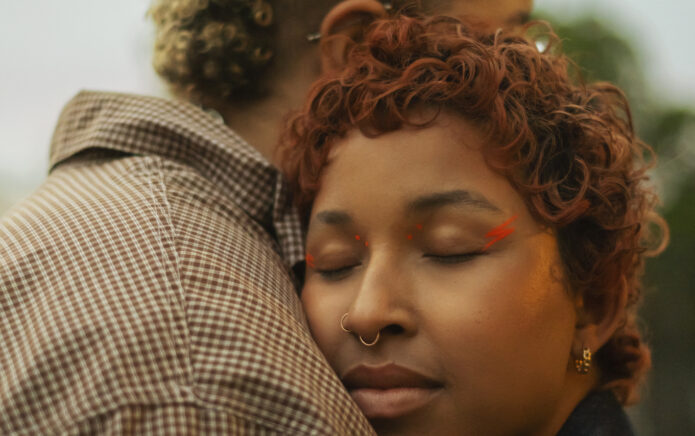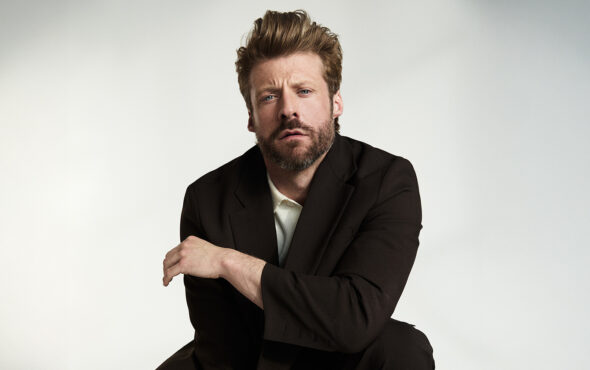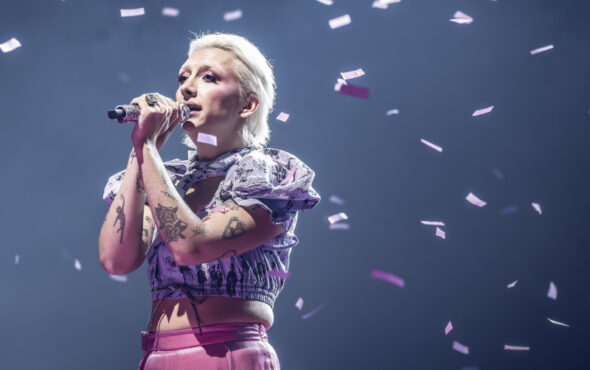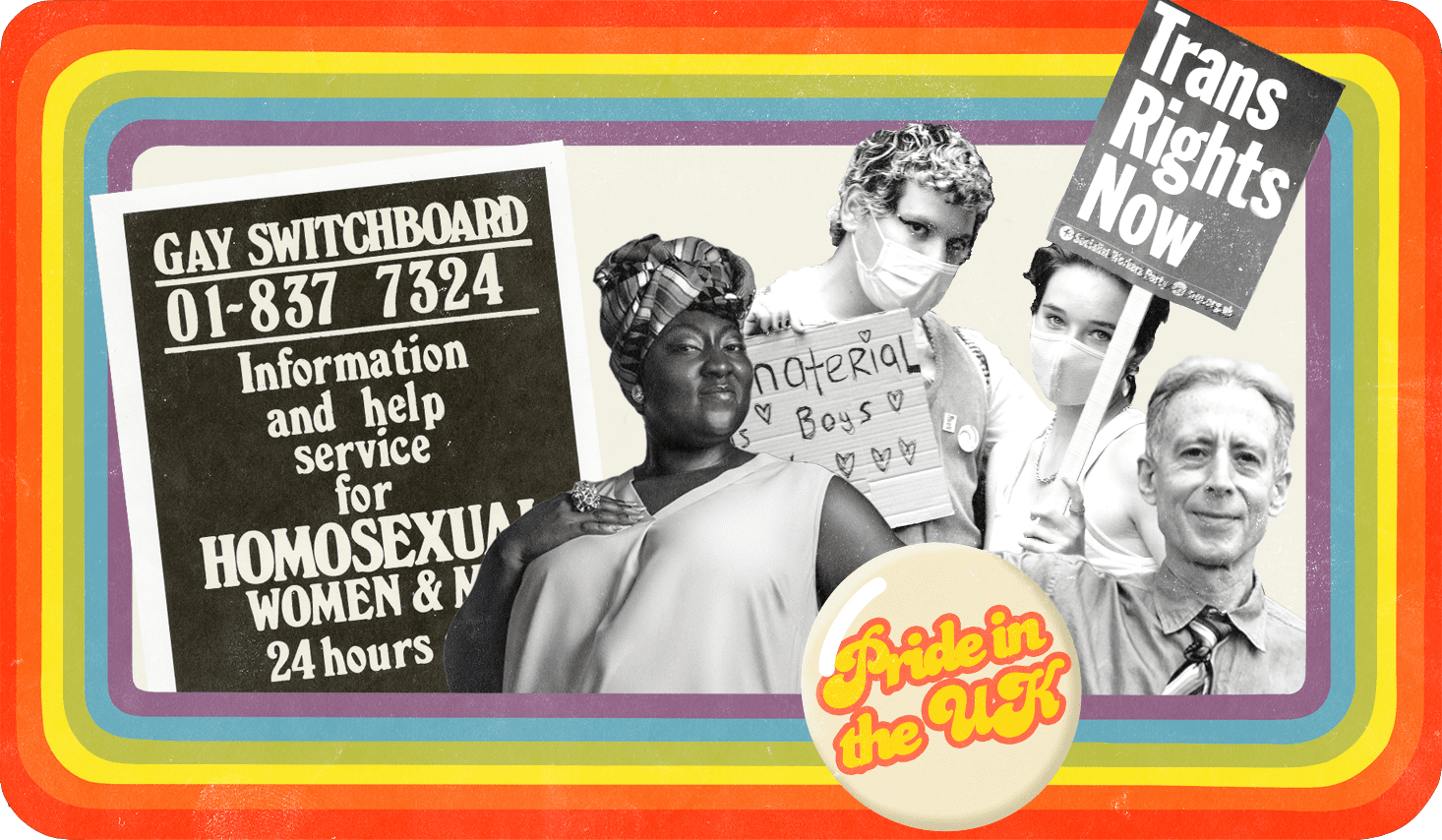
On 1 July 1972, around 2,000 people marched down Regent’s Street in London in the name of Gay Pride. Up to 40 members of the Gay Liberation Front had organised the protest, hoping it would serve as an antidote to widespread gay shame prevalent throughout the community. Same-sex sexual acts had only been decriminalised in England and Wales five years earlier, so the LGBTQ+ community was still dealing with the trauma they’ve suffered during the decades before. “They were ashamed of their sexuality and gender identity so our counter to gay shame was Gay Pride,” Peter Tatchell – one of the people who organised that 1972 Pride march – recently told GAY TIMES.
Before 1 July 1972 there had been many marches for LGBTQ+ rights across the UK, but this was the inaugural protest that would become part of the modern global Pride movement. While Pride is a calendar highlight for many LGBTQ+ people, when promoting the march back in 1972, the GLF faced resistance from the community. “Back then the overwhelming amount of LGBTQ+ people were closeted, shameful and didn’t believe they were entitled to equal rights,” Peter told us, adding that gay patrons outside of queer pubs would throw coins and beer bottles at them. “They said we were extremists, they said that demanding equal rights for gay people would only draw public attention to us and result in further oppression,” Peter explained. “Our view was that unless we fought for our rights, we’d continue to be persecuted and harassed forever.”
Over the past 50 years we’ve come a long way. Pride is now a massive annual event attended by millions of people across the globe. In the UK we’ve fought for and won many rights – from same-sex marriage, equal age of consent, the Gender Recognition Act, and the right to adopt, through to repealing the homophobic Section 28 that probited the teaching of LGBTQ+ experiences in schools in the 90s. We still have some very big battles left to win, but there’s no denying that our community as a whole feels the strongest it has ever been.
That unification of LGBTQ+ people and the victory of rights we enjoy today is one of the greatest stories in British history of the past 50 years. In the face of adversity, discrimination, and oppression, the LGBTQ+ community has persevered through the most challenging of times. This guide aims to tell a part of that story through 50 LGBTQ+ trailblazers who have positively impacted the lives of queer people in Britain over the past 50 years. Of course this isn’t an exhaustive list of the many LGBTQ+ people and organisations who have done remarkable things, but it gives a view of the courage, kindness and community-building that has helped positively shape LGBTQ+ life in the UK as we know it today.
We’ve listed 50 individuals and organisations in chronological order of the years they were active in their careers to give a timeline of LGBTQ+ people who helped create the story of Pride in the UK from that very first march in 1972 right up to the present day.
Antony Grey
Although his early work pre-dates the modern Pride movement, the late Antony Grey was widely regarded as Britain’s first gay rights activist. The former press officer for the British Iron and Steel Federation started volunteering for the Homosexual Law Reform Society (HLRS) in 1958, which campaigned to change laws that criminalised gay men. Four years later, he became secretary of the HLRS and the Albany Trust, a charity to assist gay men who developed psychological problems after being persecuted. Antony was also instrumental in forcing the government to push through the 1967 Sexual Offences Act, which laid the foundations for modern law reform. During his years post-1972 he continued to passionately fight for LGBTQ+ rights, challenge censorship, and became Secretary of the Sexual Law Reform Society. Following his death in 2010, fellow activist Andrew Lumsden credited Antony with paving the way for the Gay Liberation Front, Outrage!, Stonewall and the Campaign for Homosexual Equality. The former chief executive of Stonewall, Ben Summerskill, hailed Antony as a “real hero for gay equality” and said the British LGBTQ+ community “owe him a huge debt of gratitude”.
Allan Horsfall
In the years before the first ever Pride march in the UK, Allan Horsfall was a tireless LGBTQ+ campaigner who was a key voice in the fight for the decriminalisation of same-sex sexual acts in England and Wales in 1967. Throughout the 1970s, however, he was heavily involved with and eventually led the Campaign for Homosexual Equality. The organisation expanded massively, and at its peak consisted of over 130 local groups throughout England and Wales. It’s largely credited as one of the biggest member-driven LGBTQ+ organisations in the UK having amassed membership of more than 5,000 lesbians and gay men. During the same decade he also attempted to set up “Equire Clubs” – essentially working men’s clubs – for LGBTQ+ people, to create safe spaces for socialising and self-help facilities. He’s been routinely recognised as one of the most important and influential figures in the modern LGBTQ+ movement in Britain, laying much of the groundwork for the progress that was made after his time.
April Ashley
Model and trans trailblazer, April Ashley was one of the earliest British people known to have had sex reassignment surgery. Undergoing surgery in 1960 after saving money while working as a drag act in Paris, April then returned to the UK to pursue a modelling career. During this period, April experienced early success being photographed for British Vogue and appearing opposite Joan Collins in the film Road to Hong Kong. However, it was not widely known that she was transgender, and her career was dramatically cut short in 1961 when she was outed by the Sunday People newspaper. This and a messy divorce which eventually resulted in an annulment as the judge ruled April to be a ‘biological man’, therefore rendering the marriage invalid, effectively ending April’s career. From there, April retreated to Hay-on-Wye and later the US west coast, only returning to the UK decades later, in 2005, when she was legally recognised as female in light of the Gender Recognition Act. April’s story has since been widely praised for shining a light on the early prejudices faced by trans people in British society, discussing them in an interview towards the end of her life, April said, “They were mad, wonderful times. Why not enjoy them? That’s always been my philosophy.”
Jackie Forster
A tireless and dedicated LGBTQ+ activist, Jackie Forster first made her name as a small-time actress before chasing her true passion as a broadcast journalist. A hit with audiences of the time, she pioneered the straight-to-camera address and carried out award-winning coverage, most notably of Grace Kelly’s Monte Carlo wedding. A trip to Georgia in 1957 led to Jackie having her first lesbian encounter and realising her true sexuality. Upon leaving a failed marriage, Forster returned to the UK and moved in with her girlfriend. Her life trajectory changed in 1969 when emboldened by the UK’s decriminalisation of homosexuality two years previously, she formally came out at Speaker’s Corner in Hyde Park, telling the assembled crowd: “You are looking at a roaring dyke.” From there on her lesbian activism went on to define much of the gay rights movement; she joined the Campaign for Homosexual Equality, founded the Gay Liberation Front in 1970, took part in the UK’s first Pride march in 1972 and founded leading lesbian magazine, Sappho year later. Today, Jackie is remembered as “Saint Jackie of the Eternal Mission to Lay Sisters”, a true lesbian icon who fought fiercely for LGBTQ+ liberation.
Ted Brown
In November 1970 during a visit to the cinema to see classic gay film The Boys In The Band, Ted Brown was handed a leaflet from a newly-formed Gay Liberation Front in London. He attended GLF’s third meeting and quickly became a part of the group who, months later, would organise the first ever Pride march to be held in the UK. Ted was one of the few Black people present at the 2,000-strong march that day, but his work would go on to positively impact many. He’d later be a powerful campaigner against homophobic and racist policing in the UK, leading the Black section of Galop, as well as working for Lewisham Action on Policing. He also founded Black Lesbians and Gays Against Media Homophobia; an organisation that challenged and called out media titles who, at the time, regularly ran anti-LGBTQ+ and racist news reports in the UK overflowing with disinformation and discrimination. He continues to be a vocal advocate for the big issues still facing the LGBTQ+ community today, most notably speaking out against the horrific treatment of trans people by the British press in recent years.
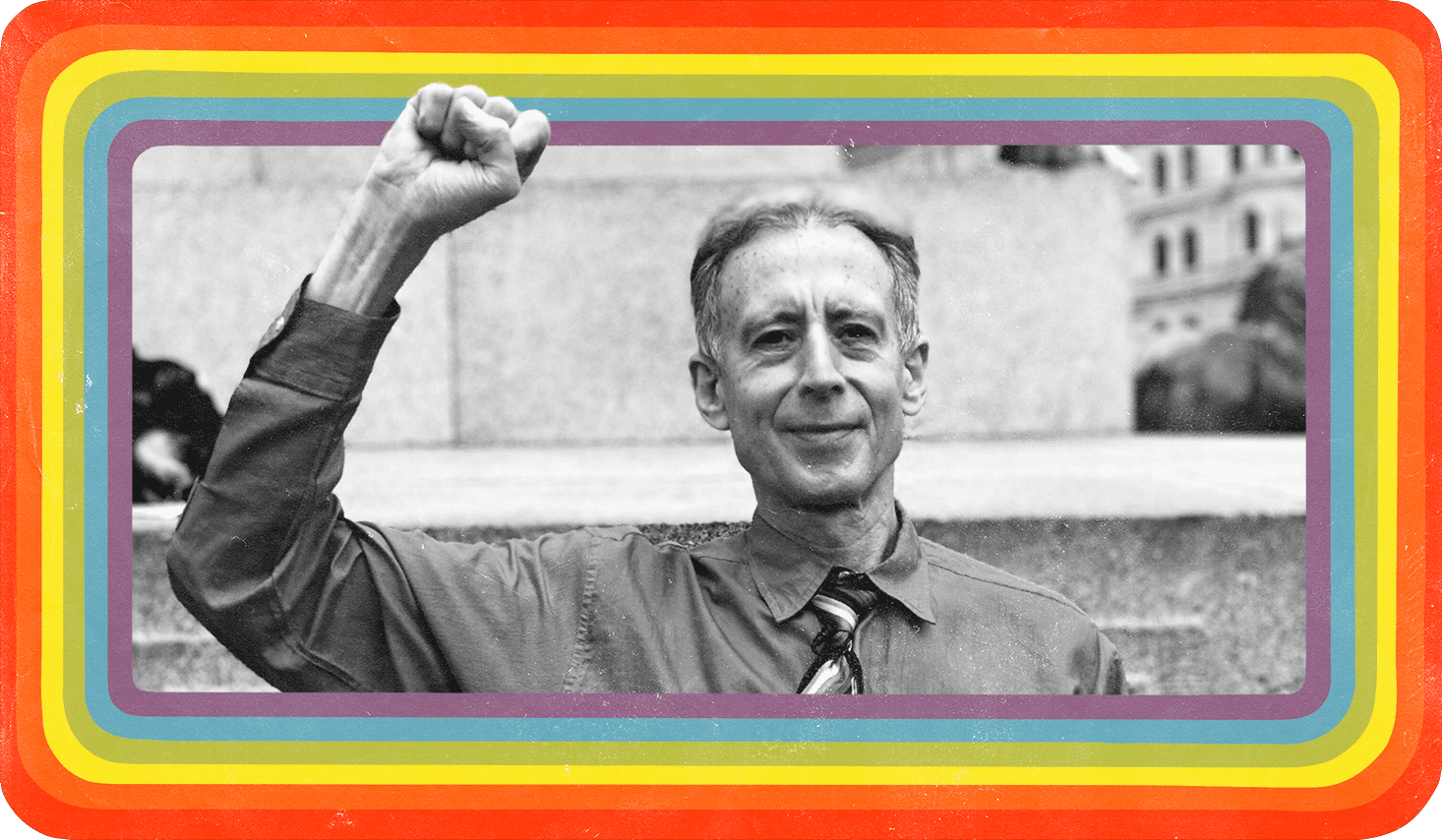
Peter Tatchell
Peter Tatchell remains one of the most prominent human rights campaigners in the UK. After moving to the UK in 1971, he joined the Gay Liberation Front a year later. This resulted in him protesting at the very first Pride march held in the UK in London on 1 July 1972. Since then Peter has dedicated his life to the fight for LGBTQ+ rights. He’s been at the forefront of the community’s greatest battles so far; from protesting against Margaret Thatcher’s discriminatory Section 28, through the equalisiation of the age of consent, to 2014’s legailsation of same-sex marriage. Throughout his 55 years of campaign work, Peter has been to 3,000 protests, has been arrested 100 times and has suffered 300 violent assaults, but he continues the fight. Most recently he’s been a vocal supporter of trans rights and a reformation of the Gender Recognition Act to allow for self ID, while also calling for the Tory Government’s long-awaited ban on so-called ‘conversion therapy’.
Switchboard
Founded in 1974, Switchboard began as an information and support helpline for LGBTQ+ people operating for five hours every evening in a small room above a bookshop near Kings Cross, London. In its first two decades, the helpline was an invaluable source of support for those coming out after the 1967 partial decriminalisation of male homosexuality, as well as one of information during the HIV/AIDS epidemic in the 80s. At this exceptionally challenging time for the queer community, Switchboard collated and maintained a detailed manual of the latest and most up-to-date news on the virus so callers could access life-saving information. Today, Switchboard remains an integral resource for the LGBTQ+ community. A 24 hour safe space available over the phone, email, and online for all people to contact, individuals can discuss a range of subjects including sexuality, gender identity, sexual health and emotional well-being.
LGBT Foundation
LGBT Foundation is a national charity rooted in Greater Manchester’s local community. It aims to help LGBTQ+ people increase their skills, knowledge and self confidence and is the UK’s largest health and community charity for queer people. Recently celebrating the 45th anniversary of its helpline, some of LGBT Foundation’s biggest achievements include providing 3,623 hours of counselling to 505 Talking Therapies clients from 2019-20 alone, giving out millions of free condom and lube sachets, and working with schools to make them safer for LGBTQ+ students. It has moved with the times, updating its goals and policies to bring it in line with the needs of queer people. Initially named The Lesbian & Gay Foundation, it became the LGBT Foundation in 2015 to be inclusive of transgender people.
Maureen Colquhoun
Maureen Colquhoun was the UK’s first openly lesbian Member of Parliament, publicly acknowledging at the time that coming out would likely thwart her chances at remaining in this position. She was right, as this and her so-called ‘radical’ feminist views resulted in her being effectively disavowed by the Labour Party, before losing her seat in the 1979 general election. “My sexuality has nothing whatever to do with my ability to do my job as an MP,” she wrote in a Gay News article in 1977. During her time in parliament, Maureen fought for women’s rights and put major societal issues at the forefront of the agenda, laying the ground for future reforms. She also gave lesbians a type of visibility that had not yet been seen from a government official in the 1970s, refusing to apologise or be ashamed of her identity at a time when LGBTQ+ representation was scarce.
Derek Jarman
As one of the greatest gay filmmakers of the late 20th century, Derek Jarman was a master of combining activism with art. His filmmaking debut Sebastiane – released in 1976 – was one of the very first British film to depict positive imagery of gay sexuality. But it was his 1986 classic Caravaggio that he is most remembered for. Starring Tilda Swinton is was revolutionary for its time, unashamed of its explicit depictions of same-sex love. Outside of film, Jarman was a committed LGBTQ+ rights campaigner, becoming one of the more vocal high profile people to challenge Thatcher’s Section 28 in the late 1980s. He also worked tirelessly to raise awareness around AIDS during the same decade and contributed to fundraising efforts to help those affected by it. He later acquired the virus and died of an AIDS-related illness in 1994.
Lisa Power
Lisa Power’s campaigning for LGBTQ+ equality is all-encompassing and started with her work as a volunteer at Switchboard in 1979, something she continued doing for 14 years. Since then, her achievements include being the first openly LGBTQ+ person to speak at the United Nations, helping to set up the Pink Paper and being a co-founder of Stonewall, among many other things. A lot of her work has focused on sexual health, with Lisa taking calls about a mystery illness which later became known as HIV/AIDS during her time at Switchboard. She went on to work with the National AIDS Helpline, as well as being a HIV policy officer with Hackney Council and the Association of London Authorities, in order to do what she could to help those living with the virus. She would eventually spend 17 years working with the Terrence Higgins Trust, ultimately becoming the Policy Director there.
Jonathan Blake
A former member of Lesbians and Gays Support the Miners, Jonathan Blake was one of the first people diagnosed with HIV in the UK and is one of the country’s oldest living survivors with the illness. In the years since his diagnosis, Jonathan has used his platform to raise awareness of HIV/AIDS and combat harmful stigma. Most recently, he appeared in Positive, a three-part Sky Documentaries series that uses intimate testimonies from some of the earliest HIV patients and real-life heroes to tell the tragedies – and triumphs – of Britain’s 40-year battle with HIV and AIDS. Jonathan was also the face of Terrence Higgins Trust’s first safer sex poster aimed at gay men and has volunteered at various HIV drop-in centres including THT, The Landmark in Brixton/Tulse Hill, Lighthouse South London and The Food Chain. His story was dramatised in the 2014 film Pride, where he was played by Dominic West.
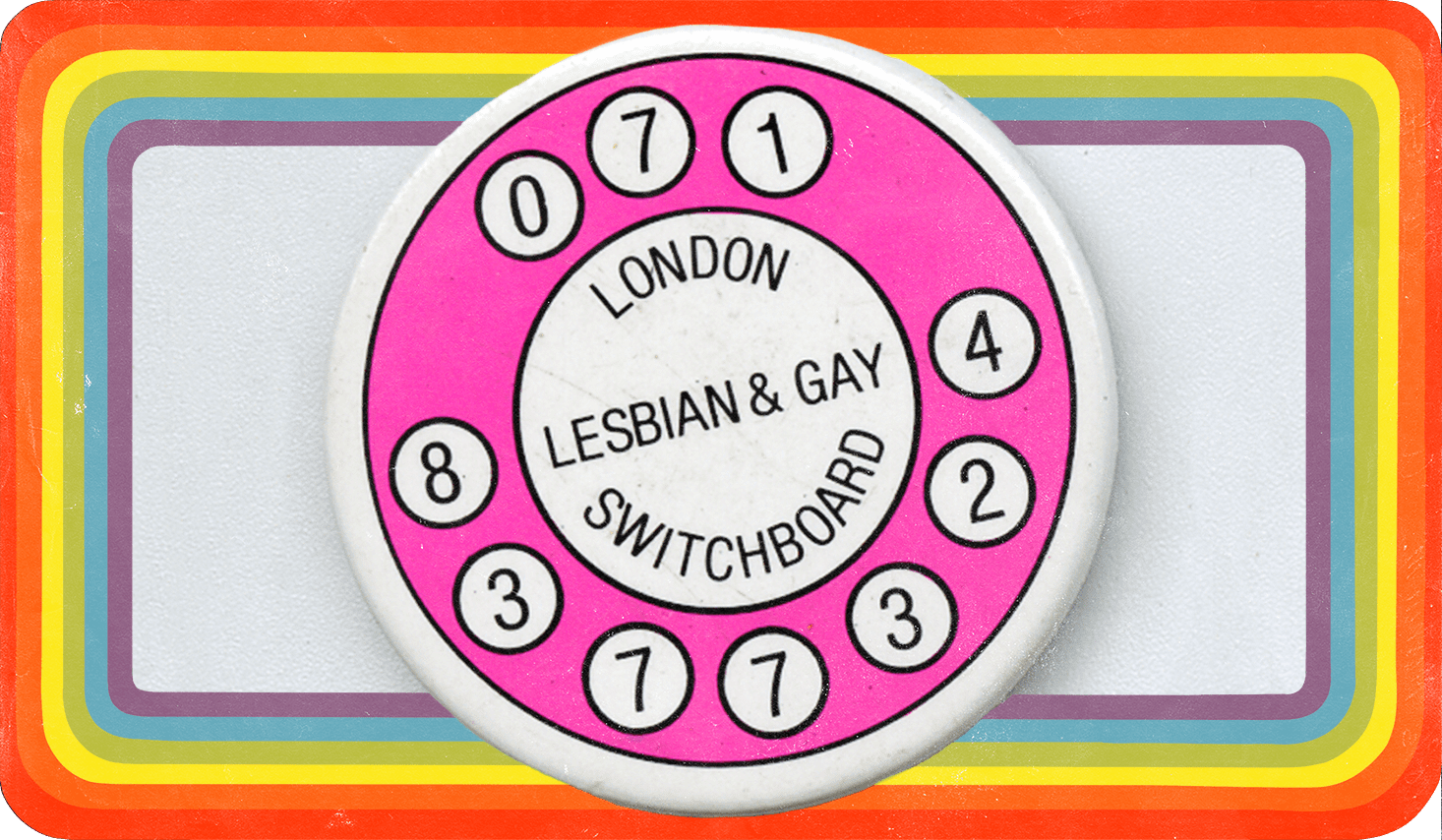
Terrence Higgins Trust
Named after Terry Higgins, one of the first people to die of an AIDS-related illness in the UK, the Terrence Higgins Trust has become the country’s leading HIV and sexual health charity. It has spent the last 40 years supporting those living with HIV/AIDS, amplifying their voices and helping them achieve good sexual health. The charity has led several high profile campaigns to tackle sexual health stigma and put these important issues at the forefront of the government’s agenda. Among these were its ‘Life Really Changed’ campaign, which focused on the things HIV positive people achieved since receiving their diagnosis, as well as its frequent calls on the government to end all new cases of the virus by 2030 – something it has now committed to doing with a new HIV action plan.
Bronski Beat
Pop-synth trio Bronski Beat saw major success in the 1980s with iconic hits such as Smalltown Boy, Why? and I Feel Love. All three members of the band, Jimmy Somerville, Steve Bronski and Larry Steinbachek, who recorded the majority of the band’s hits were openly gay, and used their music to highlight LGBTQ+ injustices in society. Their most famed example of this was their debut album, The Age of Consent. Written to campaign for the lowering of the age of consent for homosexual acts to 16 in line with the heterosexual age of consent in the UK, the inner sleeve listed the varying ages of consent for consensual gay sex in different nations around the world. It was around this time that Bronski Beat also headlined the Pits and Perverts concert at the Electric Ballroom in London to raise funds for the Lesbians and Gays Support the Miners campaign – an event featured in the 2014 film Pride. Bronski Beat wrote unapologetically queer lyrics which addressed homophobia, loneliness and family misunderstanding, the only band of its time to stand so unapologetically on a public stage for LGBTQ+ rights.
Mark Ashton
If you’ve watched the brilliant 2014 film Pride directed by Matthew Warchus, you’ll be familiar with Mark Ashton and the impact he made during his short time with us. A staunch gay rights camapinger in the early 1980s, he’s most well known for forming the Lesbians and Gays Support the Miners group who would raise money for the National Union of Mineworkers during the year-long strike of 1984–1985. The fundraising effort included the iconic Pits and Perverts concert at the Electric Ballroom in London, in which Bronski Beat’s Jimmy Somerville headlined. This support for the miners would forge a longstanding relationship between the LGBTQ+ community and labour groups, whose later support would help progress the social and legal advancement of LGBTQ+ rights. Aged just 26 years old, Mark passed away in February 1987 from an AIDS-related illness. There is a special panel on the UK AIDS Memorial Quilt created in memory of Mark and the significant activism he did.
Femi Otitoju
In 1985 there was a severe lack of queer female representation at Pride. The Pride Flag, designed by artist and gay rights activist Gilbert Baker, had, by now, been widely adopted throughout the LGBTQ+ community. But Pride itself was mostly men. Lesbian Strength was formed to create a space where lesbians could be seen on the street – and as a visible and an identifiable group. Femi Otitoju routinely marched as a proud Black lesbian, making sure she was as visible as possible. “I made it my mission to ensure, if there was a camera, or a microphone, I’d be right in front of it” she told GAY TIMES last year. “It was really important for me to carry the Black Lesbian banner. I wanted to show different images of what lesbians could be like.” Femi has since dedicated her life to equality and human rights activism, founding Challenge Consultancy in 1985 and creating training programmes for large companies to ensure there is adequate support, equality and inclusion in the workplace.
Chris Smith MP
“Good afternoon, I’m Chris Smith. I’m the Labour MP for Islington South and Finsbury and I’m gay,” Chris Smith famously said at a rally in Rugby in November 1984. His words made him Britain’s first male Member of Parliament to come out as gay publicly and, as time went on, he used his platform to speak about issues affecting LGBTQ+ people in the UK. Smith was the only openly gay MP at the time of Margaret Thatcher’s Conservative government banning the “promotion of homosexuality” with Section 28 in 1988, something he joined the public in protesting against several times. In 2005, the politician publicly shared that he was HIV positive, bringing a new level of government representation to those living with the virus as the first MP to do so. Since then, he has worked with organisations like Terrence Higgins Trust to shatter misconceptions and debunk harmful myths about HIV.
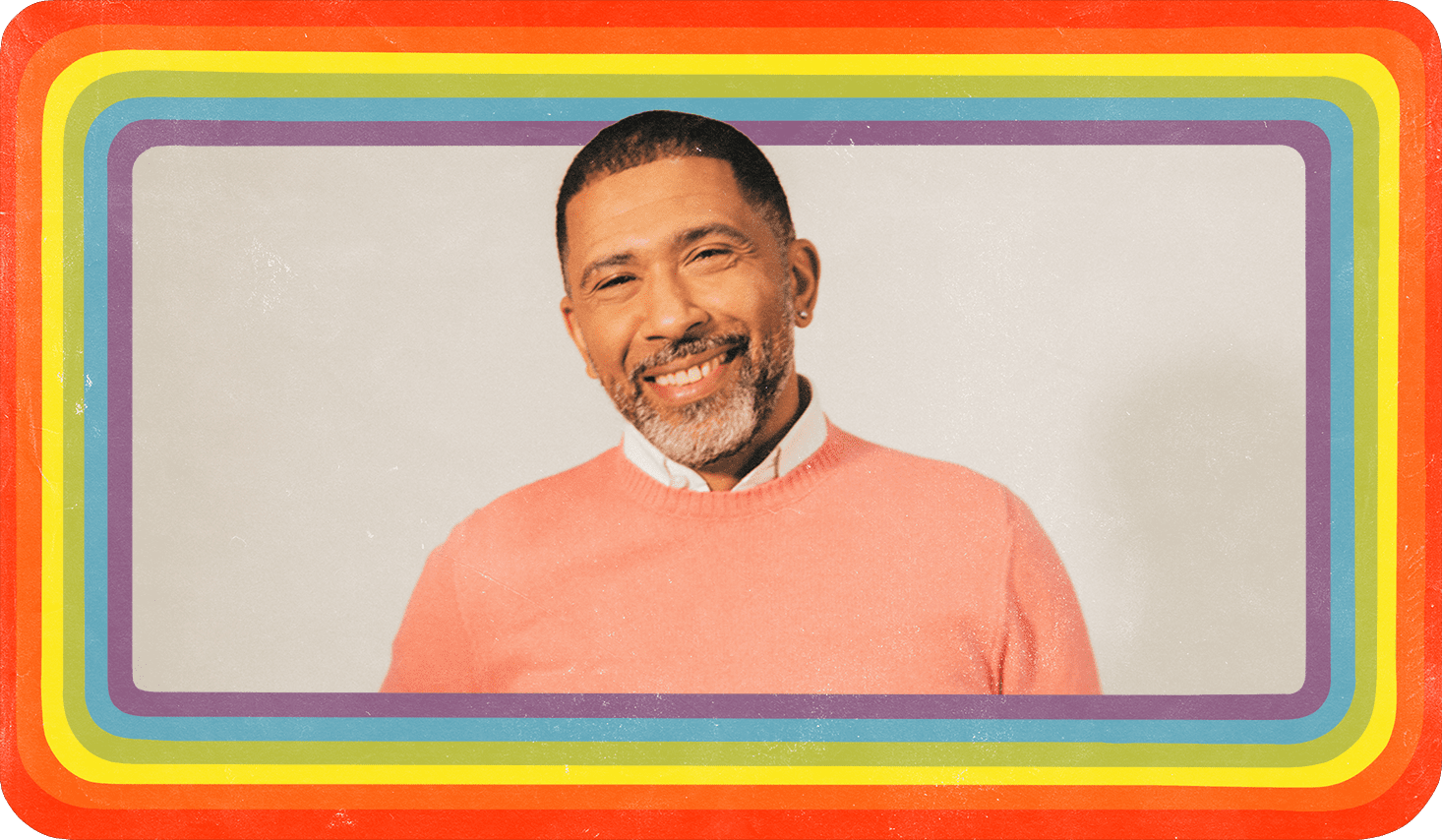
Marc Thompson
After being diagnosed with HIV in November 1986, Marc Thompson has continuously fought for LGBTQ+ rights and for Black gay men to be included in the conversation – a conversation that notoriously excluded his community when the HIV/AIDS first ravaged the LGBTQ+ community in the 80s. In 2015, Marc memorably founded PrEPster, an organisation that pushed for the drug to be available on the NHS. Three years later, he established The Love Tank, a non-profit organisation that promotes health and wellbeing of underserved communities via education, capacity building and research, where he currently works full-time as a director. He also led Positively UK’s peer mentor programme until June 2018, co-founded Blackout UK, a movement dedicated to building safe spaces for Black gay men, and up until 2019 served as the Strategic Programme Lead for Health Improvement at the Terrence Higgins Trust. Throughout his 30 years of activism, Marc has also collaborated with organisations such as the NHS, The Royal Borough of Kensington & Chelsea, Gay Men Fighting Aids and Big Up.
Sir Ian McKellen
Regarded as one of the world’s greatest actors, Sir Ian McKellen has been an out and proud LGBTQ+ activist since 1988. Previously living privately as a gay man, Sir Ian publicly came out during a BBC Radio 3 discussion about Section 28, the infamous local governement act which made the public ‘promotion of homosexuality’ illegal in the UK. Sir Ian went on to co-found Stonewall in the UK that same year, which remains the country’s leading campaign group today and lobbies for the equality and liberation of LGBTQ+ people. Since this period, the actor has used his profile to front and personally lobby for the state of LGBTQ+ rights in the UK and around the world, as a patron of LGBT History Month, Oxford Pride, LGBT Foundation, FFLAG and AKT. In a statement on his website, Sir Ian discusses his years of activism: “I have been reluctant to lobby on other issues I most care about… because I never want to be forever spouting, diluting the impact of addressing my most urgent concern; legal and social equality for gay people worldwide.”
Stonewall
Founded in response to Section 28, Stonewall was started by a small group of people who knew the LGBTQ+ community needed a professional organisation to fight for their rights. The charity has been instrumental in spearheading initiatives to support the community ever since, from introducing its world-class Diversity Champions programme to its calls for the government to ban so-called ‘conversion therapy’ for all LGBTQ+ people. “Rights are precious and our identities are precious and the anniversary of the Stonewall Riots is an opportunity to remember that we fought for the right to be here and we need to keep fighting for the right to be here,” CEO Nancy Kelley previously told GAY TIMES. Despite being a UK-based organisation, it has led global efforts to help queer people – most recently in working with the government to bring LGBTQ+ people in Afghanistan to safety.
Albert Kennedy Trust
Albert Kennedy Trust has been supporting young LGBTQ+ people into safe homes and employment, education or training for over 30 years. As a foster carer, AKT founder, Cath Hall, was acutely aware of the rejection young LGBTQ+ people face from their family home and the homophobia at large within school and society. As a result, Hall along with six queer volunteers formed AKT in Manchester in 1989, naming the Trust after Albert Kennedy, a young man who committed suicide after experiencing homophobic abuse. And so the world’s first ever service for homeless LGBTQ+ youth was born. Since it’s inception, AKT has opened the UK’s first emergency safe house for LGBTQ+ young people, helped thousands of queer youth facing or experiencing homelessness or a hostile living environment, and supported the development and launch of STREHA, eastern Europe’s first charity offering emergency accommodation to LGBTQ+ youth.
Michael Cashman (Baron Cashman CBE)
More than 17 million tuned into EastEnders in 1989 to see history in the making. Albert Square’s resident gay couple, Colin and Barry, were to share the first (proper) gay kiss to be shown on primetime British television. Colin – played by Michael Cashman – had two years earlier caused a stir with viewers after giving Barry a peck on the forehead, so this moment resulted in complete outrage. It’s a significant moment in LGBTQ+ representation on British TV, but it was only the start of the positive change Cashman would make. He soon swapped acting for activism, becoming a founding member of the LGBTQ+ charity Stonewall in 1989. He later moved into politics, becoming an MEP for the European Parliament between 1999 – 2014. Human rights – and particularly the advancement and protection of LGBTQ+ rights – was at the forefront of his work, becoming a powerful advocate for the progression of many of the rights we enjoy as a community today. In 2014 he was appointed to the House of Lords, and continues to speak passionately in support of LGBTQ+ equality.
Justin Fashanu
In October 1990, Justin Fashanu made history by becoming the first prominent professional footballer in British football to come out publicly as gay. There were hopes it would be a watershed moment for the sport, encouraging others to do the same and to acknowledge the fact that LGBTQ+ players can participate at the highest level. The reality was different. Fashanu suffered homophobic chants from football fans; he struggled to sign another major contract with a club despite being healthy; and his life became a constant barrage of salacious tabloid headlines. In a 1991 cover story with GAY TIMES Magazine, Justin admitted that he’d been offered more money to remain in the closet compared to what he got selling his story to The Sun. Justin Fashanu passed away in 1998 after taking his own life. In 2019, his niece, Amal Fashanu, set up the Justin Fashanu Foundation to challenge the continued racism and homophobia in football, acknowledging that very little feels like it has changed since Justin first came out 32 years ago.
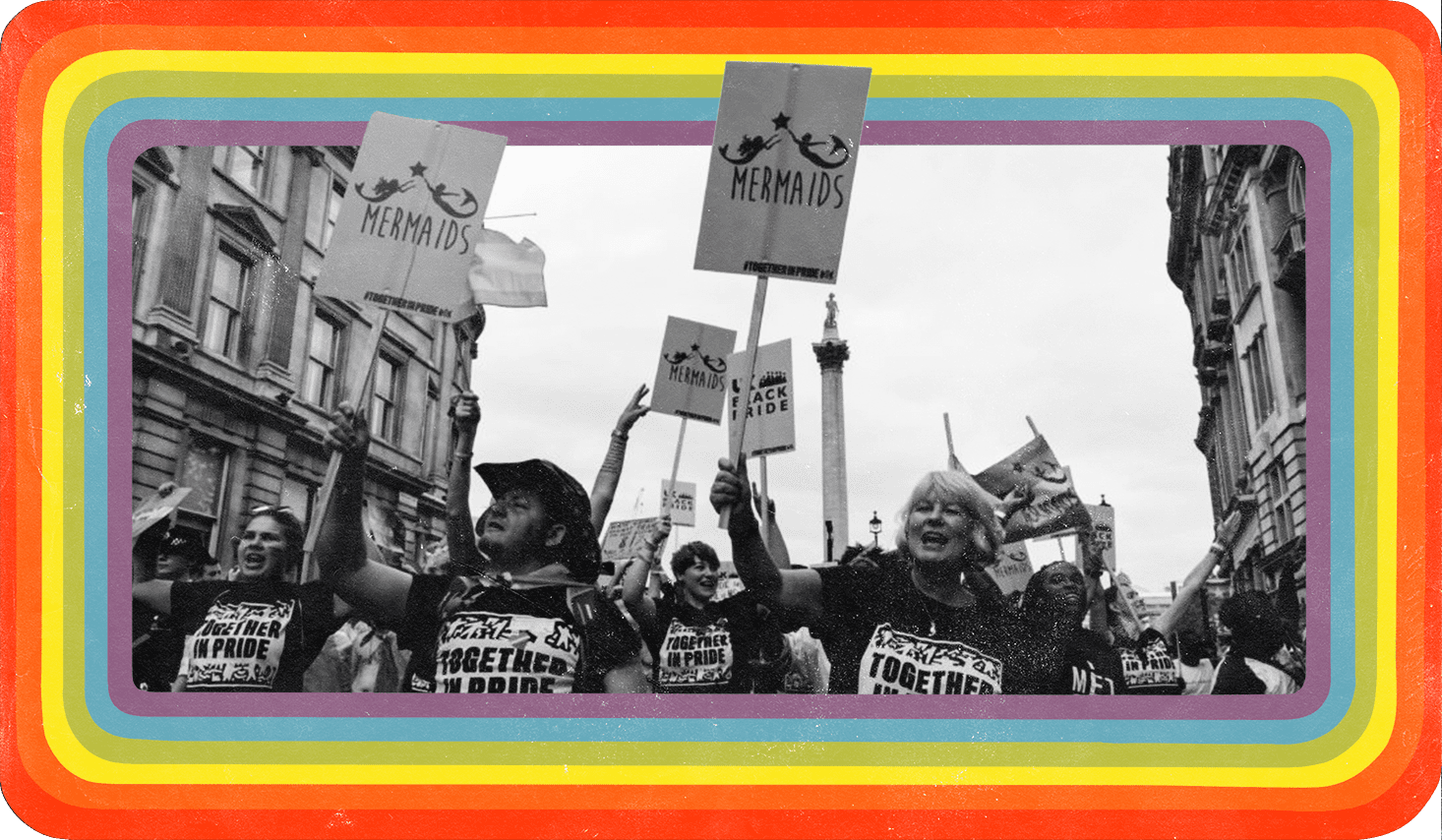
OutRage!
By 1990, Peter Tatchell and 30 other individuals had reached their limit. Section 28 had recently passed into law, prohibiting schools from teaching, or even acknowledging, the existence of LGBTQ+ people. Instead of adequately investigating the many murders of gay and bi men at the time, the police were arresting members of the community for consenting to same-sex behaviour. The offence of indecency between men – this is the same law that sent Oscar Wilde to prison in 1895 – was still in the statute books. OutRage! was born as a radical protest group to fight these injustices. They protested outside courts, government buildings and churches, calling out institutional homophobia left, right and centre through nonviolent protest tactics. However, not everyone agreed with their sometimes controversial methods. In 1994, OutRage! held a demonstartion naming 10 bishops believed to identify as gay in an attempt to call out their perceived hypocrisy. A year later in 1995, they sent letters to 20 Members of Parliament believed to be gay, inviting them to come out publicly. These are the more extreme examples of their work which spanned 21 years and largely helped jolt progress through direct action, compared to Stonewall’s more formally lobbyist approach behind the scenes.
Sir Elton John
One of pop music’s most legendary icons, Sir Elton John has been commended for his philanthropic efforts on behalf of the LGBTQ+ community. In 1992, the star founded the Elton John AIDS Foundation (EJAF), a non-profit organisation that supports innovative HIV prevention, education programmes and services to those living with HIV. Since its inception, EJAF has raised over $600 million to support HIV related programmes in 55 countries. It became notable in Hollywood after the Grammy winner began hosting the annual Elton John AIDS Foundation Academy Award Party, which is now regarded as one of the most prominent parties in the entertainment industry. Outside of his activism, Sir Elton is currently the highest-selling LGBTQ+ artist in history and his tribute to Diana, Princess of Wales, Candle in the Wind 1997, is the best-selling chart single of all time.
Euan Sutherland
In a David v Golliath story for the ages, Sutherland v United Kingdom was the court case that changed everything. At just 17, Euan Sutherland took the UK government to the European Court of Human Rights to challenge the age of consent laws and won. Back in 1994, the age of consent for homosexual men was 21, compared to that of 16 for heterosexual couples. After a lengthy legal battle, Euan was part of team who successfully had the age of consent for gay and bisexual men lowered to 16 in 2001. “Being a queer person, growing up in the nineties in Britain, has shaped who I am, what I am and where I’m going,” Euan told GAY TIMES back in 2017. “I would not be the same person as I am without having that queer identity. I didn’t predict how far this would go and how long it would take. I responded to a survey in GAY TIMES back in the early nineties and it lead to a number of wonderful things which lead to the equalising of the age of consent.”
Mermaids
For more than 25 years, leading UK charity Mermaids has worked tirelessly to support trans and non-binary youth and their families in the UK via “secure online communities, local community groups, helpline services, web resources, events and residential weekends.” Founded in 1995, Mermaids has exponentially grown to provide support for thousands of families with transgender or non-conforming children; last year alone, the charity offered their services to 4,000+ people and reached over 350 professionals working with young people. Following Mermaids’ win for the GAY TIMES Honour for British Community Trailblazer in 2020, Krystyna Hebb – Helpline Service Manager, Safeguarding Lead – said she sees the charity offering a “helpline service 24/7 along with local support groups in every main city/town of the UK” within the next five years. With anti-trans rhetoric rife in the UK, whether that’s through the mainstream media’s endless tirade on the community or the government’s confirmation that the conversion therapy won’t cover trans people, support services for young trans people has never been more vital.
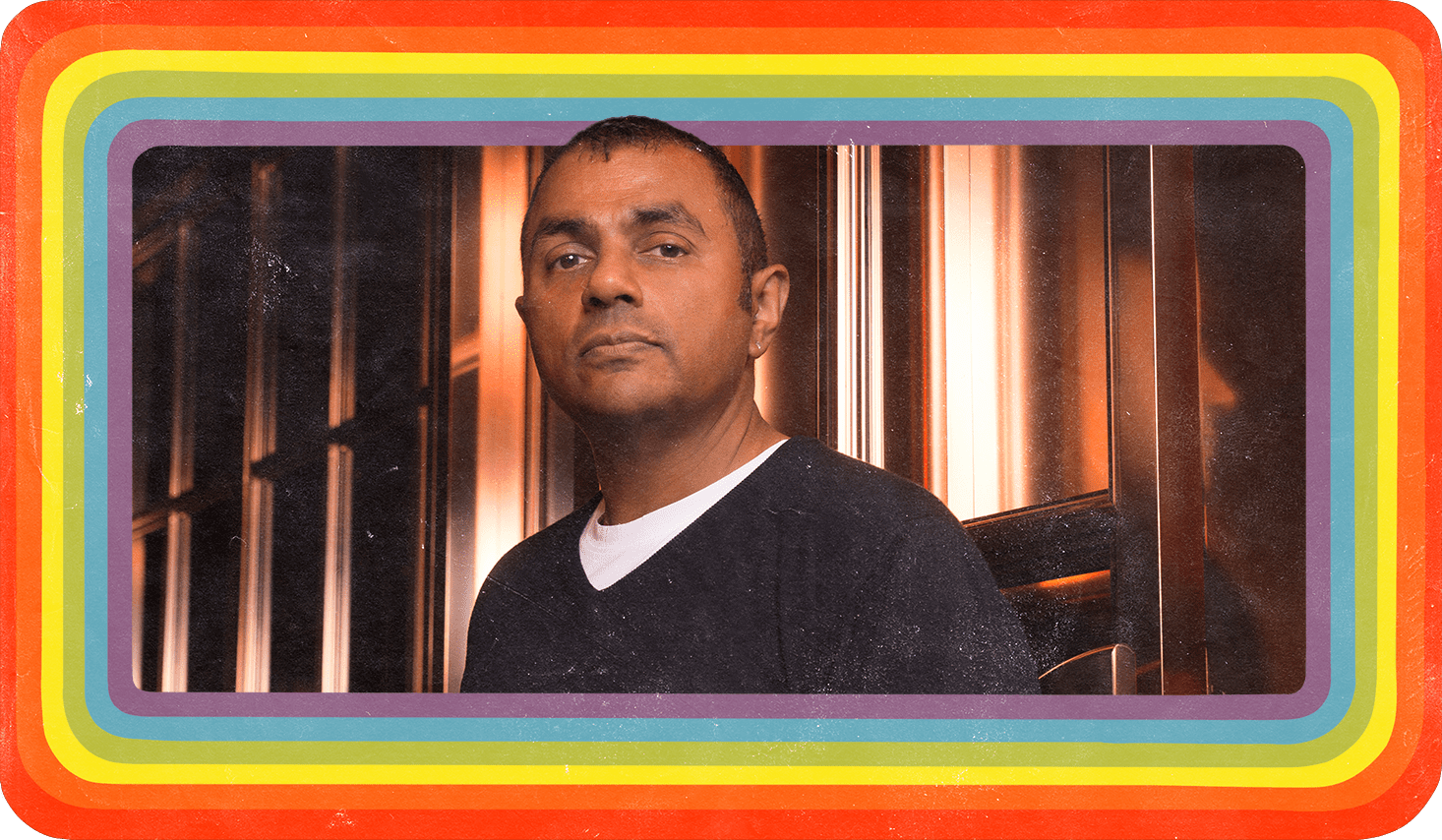
Waheed Alli (Baron Alli)
In 1998, Waheed Alli became the first openly gay peer in Parliament. Aged 34, he also became the youngest too. He has since used his political influence to advocate for LGBTQ+ rights. He led the charge on the repeal of Section 28; he successfully campaigned for the Equal Age of Consent from 18 to 16 for gay men; he challenged clauses in the Civil Partnership Act that allowed religious institution to prohibit same-sex ceremonies on their premises. For 24 years he’s been one of the greatest LGBTQ+ champions in the House of Lords. Outside of politics he’s a successful businessman, as well as a patron of numerous LGBTQ+ charities. He continues to use his influence where he can to positively progress LGBTQ+ rights.
Imaan
In 1999, Faisal Alam founded Al Fatiha UK as a support network for LGBTQ+ Muslims. It was later renamed Imaan and has gone on to become the UK’s leading LGBTQ+ Muslim charity. Their mission is make sure no LGBTQ+ Muslim person living in the UK feels excluded from their family, their faith or their communities. Following 9/11 and later the 7/7 bombings in London, Islamaphobia became more rampant in the gay scene and Imaan was there to make sure they provided a safe space for those who needed it, but also connected with communities to break down the bigotry and discrimination that pervaded the LGBTQ+ community. They marched in anti-terrorism protest rallies in rainbow-coloured hijab, and featured in a Channel 4 documentary to educate the mainstream on what it really means to be LGBTQ+ and Muslim in the UK. But most importantly of all, it has served as a support network for LGBTQ+ Muslims who need it most, allowing them to create meaningful connections and celebrate the breadth of identities and experiences that LGBTQ+ people have within the Islamic faith.
Russell T Davies
No one has celebrated queerness in its many difference forms on British television quite like Russell T Davies. The screenwriter and television executive has placed LGBTQ+ representation at the forefront of his work throughout his career, bringing queer characters and narratives to a mainstream audience. His most notable works include: Queer as Folk, a 1999 drama that chronicled the lives of three gay men in Manchester’s gay village; Cucumber, a GLAAD-nominated mini-series focusing on middle-aged gay men; and It’s A Sin, a five-part series depicting the lives of gay men who lived during the HIV/AIDS crisis in the UK. The latter, which received universal critical acclaim, made history as the most binge-watched show on All4 and was also responsible for creating an upsurge in HIV testing. For his trailblazing work surrounding LGBTQ+ visibility on television, Russell was recognised with the 2020 GAY TIMES Honour for Outstanding Impact.
Lady Phyll
Considered one of the UK’s most prominent lesbian activists, Lady Phyll is best known as the co-founder and executive director of UK Black Pride – Europe’s largest celebration for LGBTQI+ people of African, Asian, Caribbean, Latin American and Middle Eastern descent, which held its first event in 2005. In her 2018 cover story for GAY TIMES, Phyll stressed the need for QPOC spaces, stating: “Until we all have the same rights, until we all do not face any form of injustice, until we all have proper access to housing, to health, to school, to education, then there will always be need for Black Pride.” Phyll is also executive director of Kaleidoscope Trust, a non-profit organisation that campaigns for the human rights of LGBTQ+ people in countries where they face discrimination. Phyll, who has over 20 years of experience as an LGBTQ+ activist and anti-racism campaigner, is notable for her decision to reject an MBE due to Britain’s role in formulating anti-LGBTQ+ penal codes across its empire.
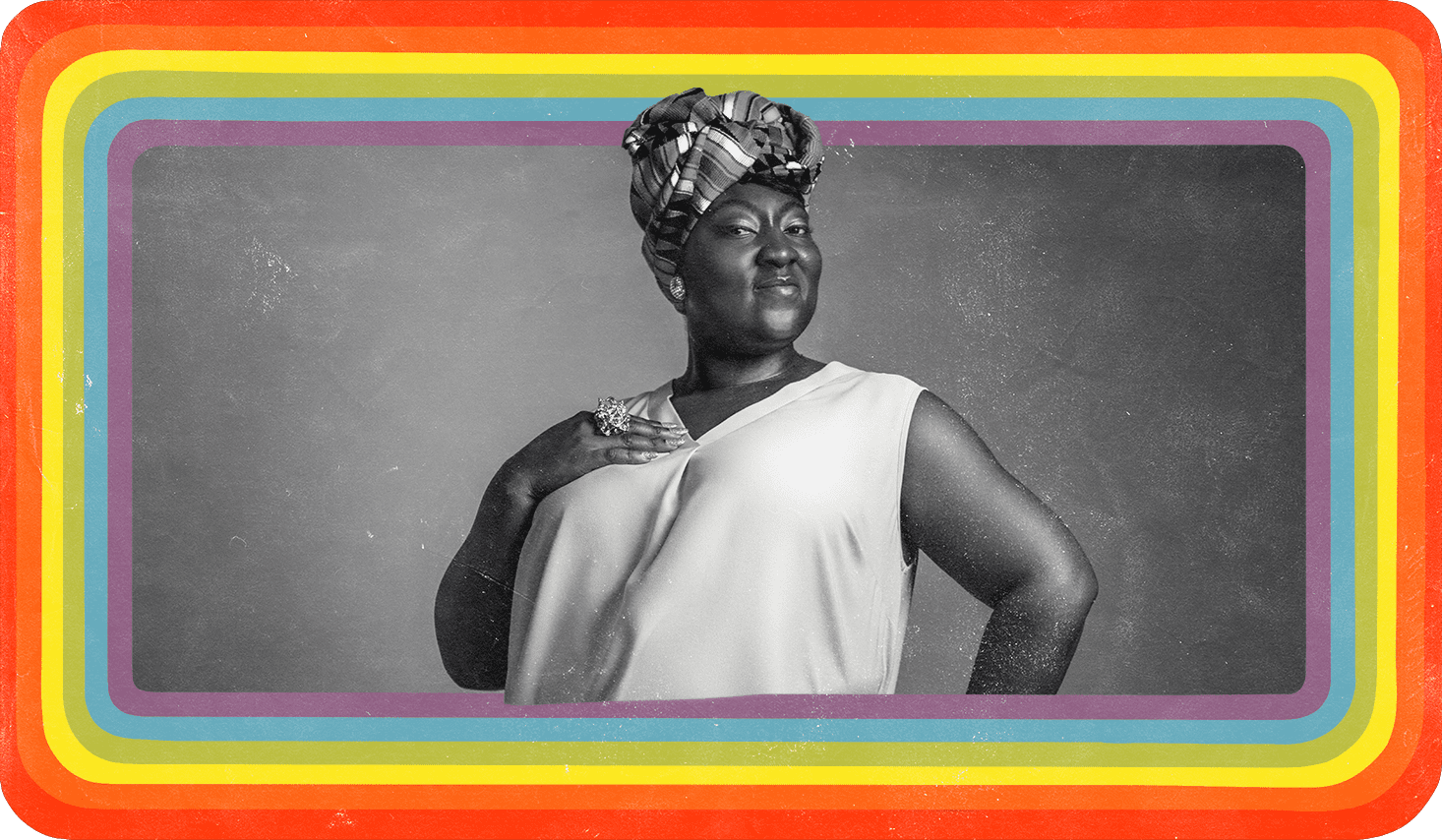
UK Black Pride
Founded in 2005 by a group of Black lesbians, UK Black Pride is Europe’s largest celebration for LGBTQI+ people of African, Asian, Caribbean, Latin American and Middle Eastern descent. The event, which attracts over 8,000 people annually (the last in-person celebration exceeded 10,000), is a safe space for all sexualities, gender identities, cultures, gender expressions and backgrounds. After announcing the theme for the 2022 event as ‘power’, CEO and executive director Lady Phyll said the vision for UK Black Pride has “always been to meet and exceed the expectations of the communities we represent and fight for”. She added: “Each year, we consider how – through programming, protest and politics – we can create a space where our identities and our cultures can be expressed safely, in partnership with councils and venues that understand how important our communities are to us”.
Bisi Alimi
A nigerian LGBTQ+ activist and HIV/AIDS advocate, Bisi Alimi is most known as the first Nigerian to come out on national television. Long before doing so in 2004, Bisi began his advocacy career in the late 1990s in Nigeria when a number of his friends died from HIV/AIDS. From community mobilization work, including condom distribution and safe-sex education, to joining Alliance Rights Nigeria in 2002 as a Programme Director, Bisi’s activism contributed to the safeguarding of an entire community in a country that had rejected them. Bisi felt the public pain of this upon coming out on national TV. Receiving a mixture of praise and death threats in the years later, Bisi was forced to flee Nigeria following threats to his life in 2007. He has been a resident of the UK ever since being granted asylum in 2008 and in 2014 he was conferred with British citizenship. Since being in the UK, Bisi has continued to fight for LGBTQ+ liberation, founding the Bisi Alimi Foundation and co-founding The Kaleidoscope Trust, a nonprofit organisation that campaigns for the human rights of LGBTQ+ people in countries where they are discriminated against.
Gareth Thomas
Gareth Thomas hails from Brigend, Wales and is regarded as one of the best Welsh rugby players of all time. After many successful years on the pitch as once the most capped Welsh rugby union player and Wales’ third highest try scorer, Gareth publicly came out as gay in 2009, making him the first openly gay professional rugby union player. Celebrated for this feat, he has since used his platform to discuss his identity and said how he hopes his coming out will inspire a younger generation of rugby players to do the same. A decade after coming out, Gareth also revealed he is HIV positive. To break the stigma around his diagnosis, the former rugby player made a documentary about his status and took part in an Ironman triathlon to highlight how HIV hadn’t and wouldn’t weaken him. Today, Gareth works closely with Terrence Higgins Trust and Prince Harry, Duke of Sussex to publicly discuss his experiences with HIV and being gay in the sporting world.
Paris Lees
Writer and presenter Paris Lees effortlessly uses her platform to spotlight trans experiences and discuss wider LGBTQ+ and societal issues. Growing up, Paris faced bullies and a difficult upbringing, but after spending time in prison, she decided to turn her life on its head. She got an education, moved to London and worked at GAY TIMES, a magazine she had read in prison, as well as a string of other publishers, before carving out the successful career she has today. Since then she has experienced a lot of firsts; She was the first openly trans woman to present a show on Radio 1, the first to present a show on Channel 4, the first to appear on Question Time and Vogue’s first transgender columnist. Recently documenting the first stages of her life in her 2021 book What It Feels Like For A Girl, the novel-memoir is based on Lees’ life aged 13–18, beginning in 2001 and has received widespread critical acclaim.
Son of a Tutu
Son of a Tutu, the 2011 winner of Drag Idol UK, has performed across the UK and Europe and hosted various cabaret events, talent shows and Pride events. In lockdown, the star led events for Amnesty International and ParaPride, as well as Bingo on Victoria Beckham’s Instagram account. Following the uprising of the Black Lives Matter movement in 2020, Son of a Tutu created and directed #YouCanDoBetter, a viral collaborative video that explored microaggressions experienced by people of colour. The award-winning activist also spoke about their experiences as a British-Nigerian drag queen for BBC Stories, which has been viewed over half a million times to date. More recently, Son of a Tutu appeared as Sandra Bollock in Prime Video’s adaptation of the critically-acclaimed musical Everybody’s Talking About Jamie.
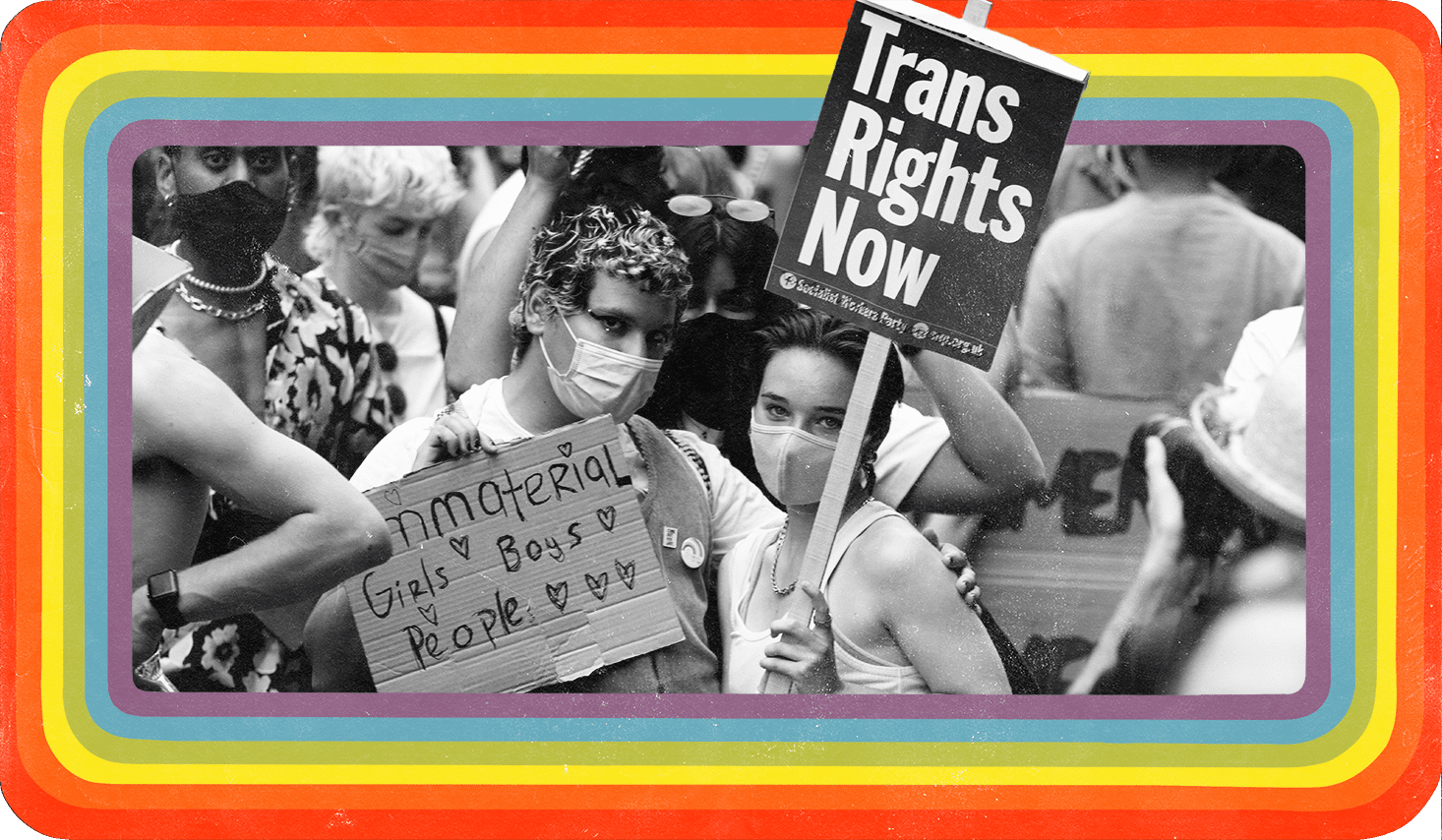
Charlie Craggs
LGBTQ+ activist and author, Charlie Craggs rose to prominence with her campaign, Nail Transphobia. Travelling around the UK with her pop up nail salon and squad of trans nail techs, the campaign offers the public free manicures for the chance to sit down and have a chat with a trans person in a bid to break misconceptions and make allies. The 2013 campaign was a huge success and cemented Charlie as one of today’s most influential trans voices. She has since gone on to write award-nominated book, To My Trans Sisters, a collection of letters by successful trans women and campaign for the inclusion of a trans flag emoji in Unicode, a cause subsequently actioned in 2020. More recently Charlie also became only the second ever trans companion in the history of Doctor Who, landing one of the leading roles in the spin-off podcast Doctor Who: Redacted. Today, Charlie uses her platform to highlight the struggles facing the young trans community and put them on the national agenda, with a recent example of this being her BBC Three documentary Transitioning Teens.
Travis Alabanza
Travis Alabanza has become notable in the UK for vocalising their support for trans and gender non-conforming individuals. The performance artist and writer, who first had their poetry published in the Black and Gay in the UK anthology in 2015, has travelled across the UK with their theatre show Stories of a Queer Brown Muddy Kid, as well as Burgerz, which ran in the UK between October and November 2018. They’ve also featured as a panellist at over 40 universities across the country – including Oxford and Harvard – to discuss race, sexual orientation and gender for LGBTQ+ and Black History Month. At 21-years-old, Travis became the youngest recipient of the artist in residency program at Tate Galleries. In the same year, Travis starred in Chris Goode’s adaptation of Derek Jarman’s Jubilee on stage in Manchester. Other notable works include their self-published book of poetry about their experiences as a Black, trans feminine and gender non-conforming person in Before I Step Outside (You Love Me), and Overflow, a critically-acclaimed Bush Theatre Production about trans safety in public toilets. Travis’ writing has also appeared in the BBC, Guardian, Vice and Gal-Dem.
Just Like Us
In the past six years, LGBTQ+ youth charity Just Like Us has collaborated with various primary schools, secondary schools and colleges from all corners of the UK to help improve the lives of queer youth. Thousands of institutions take part in their annual, UK-wide celebration of LGBTQ+ equality, titled School Diversity Week, which sees their ambassadors speak about the importance of allyship and their own experiences with sexuality and/or gender identity. Dominic Arnall, CEO, told GAY TIMES that young queer people are “twice as likely to be bullied, experience depression, have anxiety and contemplated suicide”. Independent research from Just Like Us found that half of secondary school pupils are getting little to zero positive messaging about being LGBTQ+, “despite LGBTQ+ inclusive education being linked to pupils feeling safer in school and being less likely to experience suicidal thoughts.” With a recent study from the Office for National Statistics (ONS) revealing that the amount of people who identify as lesbian, gay or bisexual doubled in the UK from 2014 to 2020, services such as Just Like Us are crucial for LGBTQ+ young people.
Khakan Qureshi
Khakan Qureshi is a support worker, speaker and writer who founded Finding a Voice, Birmingham’s first-ever multi-faith, voluntary-led social and support group for South Asian LGBTQ+ communities aged 18 and over. The Stonewall LGBT School Role Model and Diversity Role Model has also fronted various campaigns in support of No Outsiders and the RSE educational programme, and written about his experiences for several publications such as Buzzfeed and Gay Star News. For his work challenging homophobia and Islamophobia, Khakan has been awarded a British Empire Medal in the New Year’s Honours List 2021 and is the recipient of the Points of Light Award from Downing Street. The activist also memorably became the first gay Muslim to appear on an episode of Come Dine With Me. In a 2019 essay for GAY TIMES, Khakan said it’s his mission to make the “conversation about faith and sexuality to be more open and transparent”.
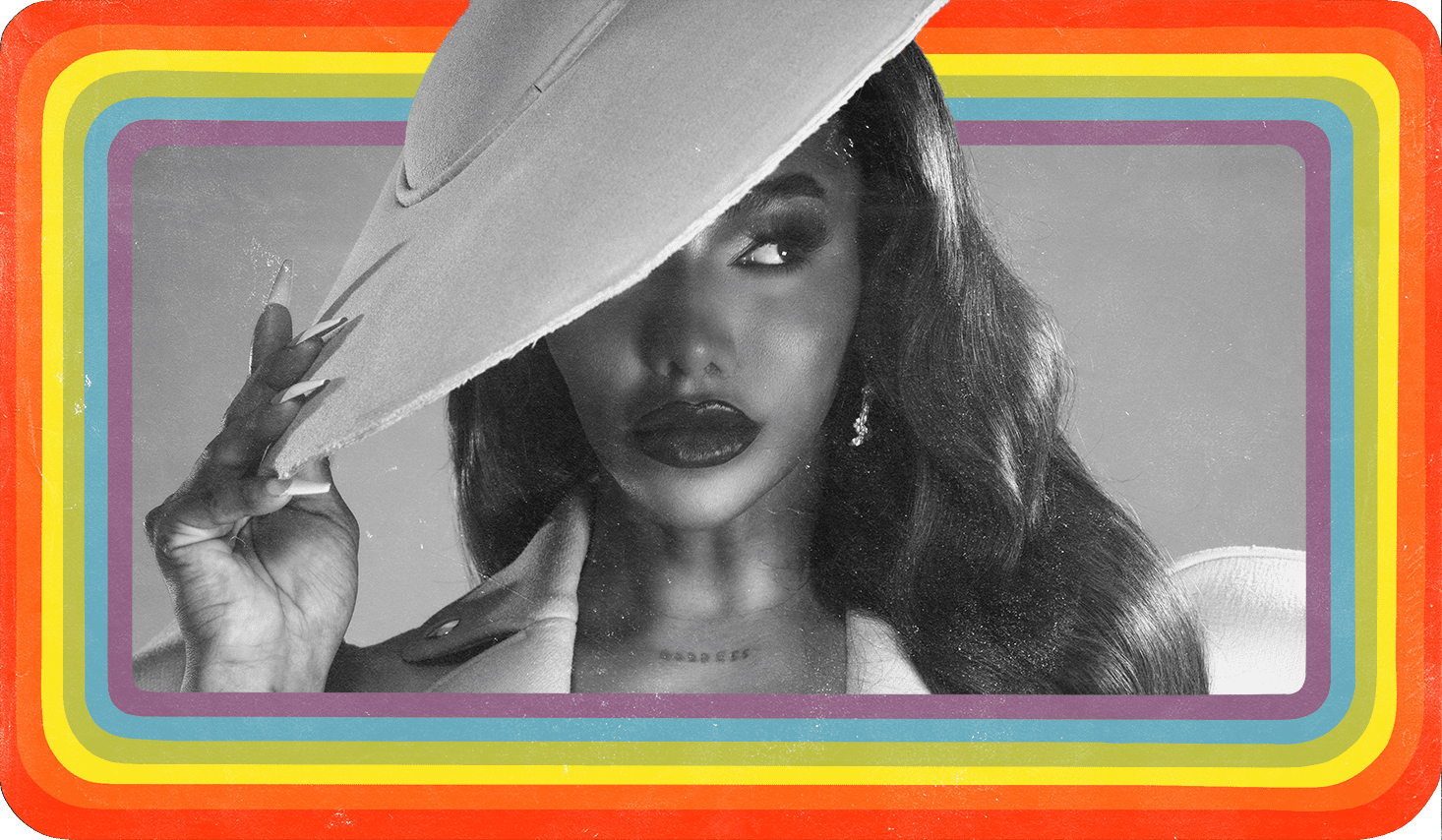
Munroe Bergdorf
Whether it’s taking a stand against systemic racism or advocating for transgender equality, Munroe Bergdorf has consistently used her platform for good. The model has become one of Britain’s most distinctive activists in doing so, receiving an honorary doctorate from the University of Brighton in the process. In 2021, Munroe was recognised with the GAY TIMES Honour for British Community Trailblazer at the fifth annual GAY TIMES Honours celebration in London, where she was presented the award by Ellie Goulding. And earlier this year, Munroe made history as the first transgender person to feature on the front cover of Cosmopolitan UK for their 50th anniversary issue. “Equality doesn’t [currently] exist. We live within a system that thrives on inequality,” she told the publication. “We need to think about how we can build a system where all of us can win.”
Jayne Ozanne
Jayne Ozanne has continuously campaigned to bring an end to so-called ‘conversion therapy’ through leading protests, raising awareness by discussing her own experiences of the harmful practice and challenging those in power whenever possible. She now chairs the Ban Conversion Therapy Coalition and, just last year, resigned as an adviser to the government because of the “hostile environment” it has been creating for LGBTQ+ people. Jayne, who is a gay evangelical Christian, has been a pioneer in working with religious organisations to eliminate discrimination based on sexuality and gender, something she founded the Ozanne Foundation in 2017 to help achieve. In March of this year, she helped bring more than 150 senior religious leaders, academics and lay leaders from all over the world together to agree on measures that will help protect queer people from discrimination they may face in their religious communities.
Bi Pride UK
“We believe that people who experience attraction beyond gender deserve to be able to celebrate their identities publicly, visibly and proudly in all spaces without fear of ridicule, erasure or harassment,” states Bi Pride UK, the only registered national charity championing those within the bisexual umbrella. The annual celebration was founded in 2017 in retaliation to the lack of visibility for the community a at Pride events, and to challenge years of stigma and discrimination within the LGBTQ+ community. In 2020, the organisation won Charity of the Year at the LGBT Awards, becoming the first bisexual charity to ever win such an award. Bi Pride UK has also launched a zine, titled Unicorn, to accurately represent the stories of “bisexuals, pansexuals, biromantics, asexuals and polysexuals”.
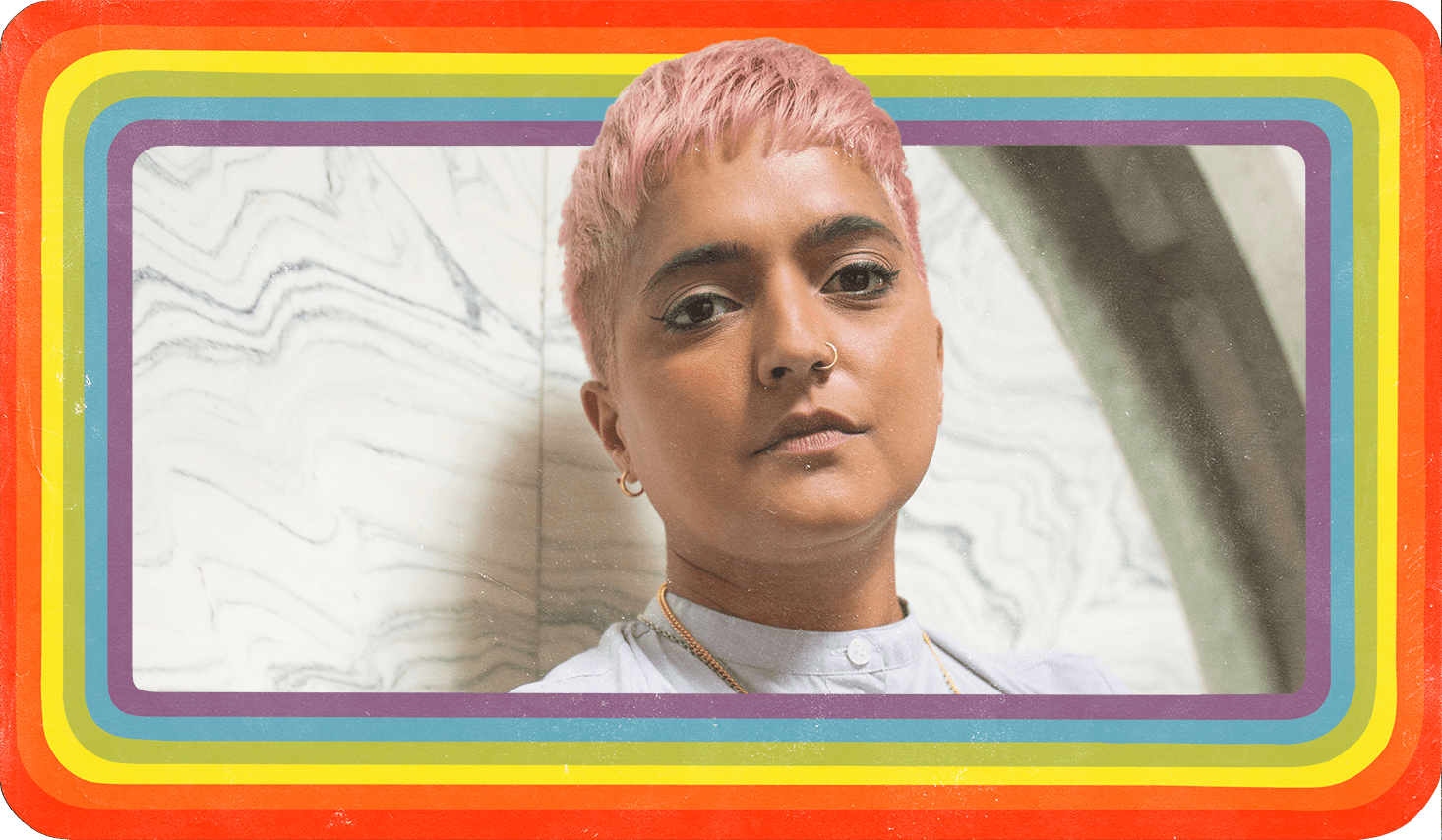
Reeta Loi
Multi-hyphenate Reeta Loi wears many hats; artist, producer, radio host, public speaker, activist and a successful former career in the creative and tech industries. But it was in 2017 after a few years speaking publicly but anonymously on the South Asian LGBTQ+ experience that Reeta decided to become more visible. Reeta noticed that there was a severe lack of support for LGBTQ+ South Asian people in the UK, and so they founded Gaysians. It prides itself on being “the world’s most comprehensive support platform for South Asian LGBTQ+ people of the diaspora, promoting 25 vetted organisations internationally.” Through events, resources and a growing network, they are fast becoming a vital hub for LGBTQ+ South Asian people in the UK and globally, who have often been overlooked. Reeta has also used their voice to educate on the rich queer history present in South Asian cultures, more recently contributing to GAY TIMES and raising awareness of this very fact.
Anick Soni
In 2018, Anick Soni organised the first intersex march at Pride in London, raising awareness of a community that has been, for too long, overlooked. He came out as intersex at the age of 21, and has since used his voice to provide representation and help others who have felt ashamed or silenced. “I never thought I’d be proud of the parts of me I grew up hating,” he told GAY TIMES. “The more I discovered how little there was out there for me to learn what intersex is, the more determined I was to share my story in the hope of finding my community and changing my world.” One of the biggest fights the community still faces is the fact that, unlike sexuality or gender identity, being intersex is not a protected characteristic under the Equality Act 2010. “This has wide-reaching implications on many areas from health to protection from discrimination,” explained Anick. It also means that hospitals across the UK (and the world) continue to perform surgeries on intersex children without their consent. Anick continues to raise awareness through advocacy work and media in the hopes that progress can be made to better support and protect intersex people.
ParaPride
Launched in 2019, ParaPride is an empowerment charity that advocates for LGBTQ+ people living with disabilities, impairments, health conditions or alternative needs. Through its work with social venues, public spaces and online platforms, ParaPride has strived to meet this community’s needs and make society more inclusive of everyone. At its first event in August 2019, which was hosted at the Royal Vauxhall Tavern in London and included panel discussions and stage events, the charity called on LGBTQ+ people to address the discrimination those with disabilities continue to face. “We want people to know that there are people within the LGBT community who are disabled and we don’t want people to discriminate [against] disability within the community,” ex-teacher Domenico Pasquariello told Reuters at the time.
Trans+ Pride
The first Trans+ Pride was in 2019, a year after a group of trans-exclusionary radical feminists crashed the front of the Pride in London march to promote their transphobic and vitirolic agenda. But what began as a reaction to hate, has resulted in one of the most important and celebratory events in the queer calendar. Giving trans+ people a space to feel proud and celebrate who they are in safety surrounded by their community in one of the biggest cities in the world and in a country that has been experiencing an increase in LGBTQ+ hate crimes, is an invaluable experience. Trans+ Pride has done this for thousands of people since 2019 and will proudly put protest at the heart of pride celebrations in years to come.
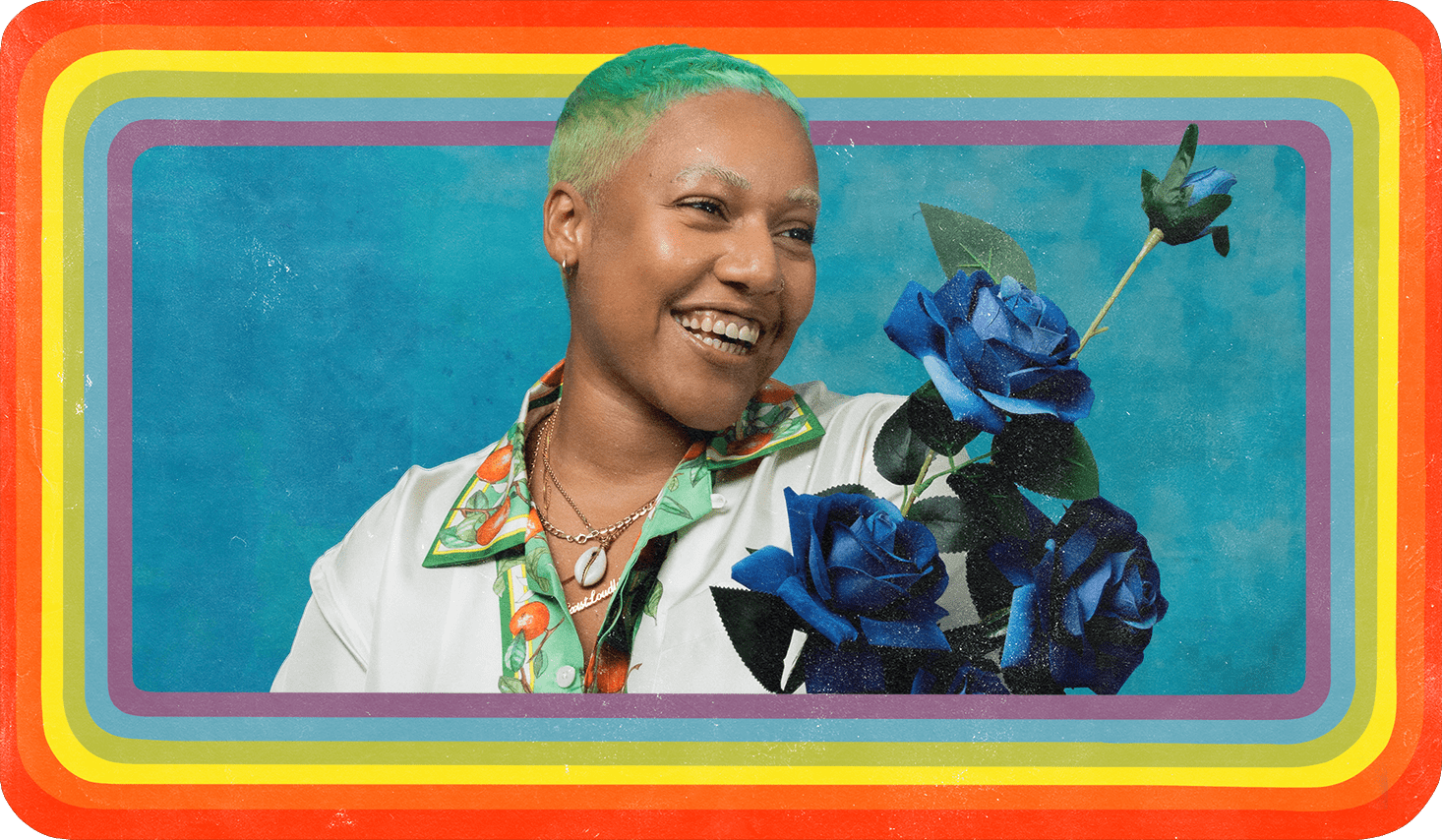
Tanya Compas
In 2019, British youth worker and LGBTQ+ rights activist Tanya Compas started to create her own charitable initiatives, launching the annual event Queer Black Christmas which specifically offers queer Black youth the opportunity to meet with others, have food and celebrate in a safe space during what can be an incredibly difficult time of year for LGBTQ+ people. In 2020, Tanya raised more than £110,000 during the Black Lives Matter protests for her Exist Loudly fund. The charity was set up to “support the needs of young people in the queer Black community”, through a series of monthly workshops, mentoring projects and fun activities.” It also allocates physical supplies to those who need it – like breast binders – making sure the Black LGBTQ+ youth of today are receiving the support they need.
Shon Faye
Shon Faye is a London-based writer, activist and journalist. Rising to prominence as a journalist, Shon is known for her commentary on LGBTQ+ issues and particularly trans liberation. The former editor-at-large at Dazed, today Shon is most known for her hosting of the podcast Call Me Mother, which tells the stories of older LGBTQ+ trailblazers, and as the author of the 2021 book The Transgender Issue: An Argument for Justice. The Penguin bestseller has been lauded by critics and readers for its blistering commentary on the current state of trans lives in the UK today and the systemic violence and intolerance faced by an entire community. Speaking about why she wrote the book to GAY TIMES, Shon said: “There was a need for some kind of intervention of sorts into the public discourse and mainstream media, and realising that I was fortunate enough to have the kind of platform to be able to do that.”
Jake Daniels
In May 2022, Jake Daniels became the UK’s first male professional footballer to publicly come out as gay since Justin Fashanu in 1990. The newest addition to this list, Daniels’ bravery in sharing his authentic self in an industry with little LGBTQ+ representation is sure to be an inspiring thing for many members of the community. At the age of just 17, he has already committed himself to being a “role model” for other LGBTQ+ people wanting to come out. “I hate knowing people are in the same situation I was in,” he previously told Sky Sports News. “I think if a Premier League footballer does come out that would just be amazing. I feel like I would have done my job and inspired someone else to do that. I just want it to go up from here.”
This timeline is just a snapshot of the remarkable activism and awareness that has helped positively shape LGBTQ+ life in Britain over the past 50 years. There are many more heroes who have contributed, and we implore you to go find them, read about their work, and celebrate their brilliance.
